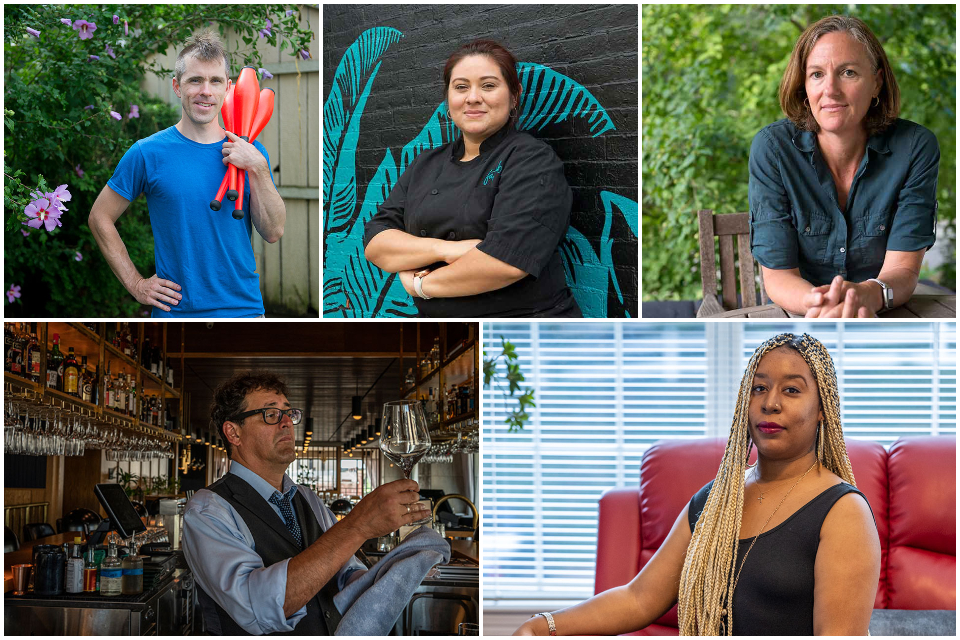Cascading Lives: Voices from the pandemic
Brandeis sociologist Karen V. Hansen delves into the life histories of people working in the hospitality industry
 Photos/courtesy, Cascading Lives
Photos/courtesy, Cascading LivesSubjects in Cascading Lives are wide-ranging. Bartenders, housekeepers, restaurateurs, events coordinators — even a circus juggler.
Steve is a restaurant owner in Massachusetts who had to temporarily shutter his businesses but weathered the pandemic thanks to government relief programs.
Mayra is a Salvadoran immigrant living in Boston who lost her restaurant job and missed her family desperately. She says 2020 was the worst year of her life.
Their stories are part of Cascading Lives, a project led by Victor and Gwendolyn Beinfield Professor of Sociology Karen V. Hansen that delves into the life histories of dozens of people working in the hospitality industry. The project, co-directed by Hansen and Boston University sociologist Nazli Kibria, examines how cascading moments, like the pandemic, create a constellation of crises in people’s lives, and, in some cases, economic decline.
"Downward mobility is as common as upward mobility, if not more common. But social scientists tend to focus on the upward because it's consistent with the American dream and what we want to be able to achieve as a society,” said Hansen.
“But downward mobility — in a precarious economic environment where people have more gig jobs and fewer benefits — hits hard. We don’t often see the stories of the people who take that tumble.”
The backgrounds of the participants in the project are wide-ranging. Bartenders, housekeepers, restaurateurs, events coordinators — even a circus juggler — all tell different stories of how the pandemic changed their lives. For some, it was a bump in the road. For others, it was devastating.
By chronicling each subject’s life history, the project captures more than the pandemic’s economic impact. “How they feel, how they interpret what happens to them, how they react, what resources they mobilize; there are all kinds of consequences,” said Hansen. “We're interested in the many dimensions of cascading events.”
The Brandeis and BU team conducted multiple interviews with 34 subjects from Massachusetts and Georgia, resulting in written profiles and audio clips hosted on a Brandeis website, along with a digital toolkit for teachers and a high school curriculum.
The team behind the project was established in the Cascading Lives Research Group, an organization Hansen started to bring together sociologists, historians and economists to study downward mobility that was funded by a Provost Research Grant in 2018.
It was funded by a $100,000 grant from the Bill and Melinda Gates Foundation in partnership with the Raikes Foundation, as part of the Voices for Economic Opportunity Grand Challenge. Launched in 2019, the initiative seeks to elevate diverse voices and broaden the national conversation about poverty and economic mobility. Cascading Lives was one of 28 projects funded out of more than 1,200 applications in the first round, and received a second round of funding in 2021.
The project originally intended to study downward mobility in places with differing political and demographic landscapes — Massachusetts and Georgia. The grant application was submitted in 2019, but by the time it was awarded in 2020, the pandemic was in full swing.
“Given the economic impact of the pandemic, we decided to focus on hospitality workers,” Hansen said. “It was a sector of the economy that shut down quickly and left a lot of people unemployed and absolutely reeling. How did people manage? What kinds of resources did they have? What difference did those resources make?”
The project’s findings could support legislation to interrupt or reverse downward mobility, while the digital toolkit provides high school English and social science teachers with a curriculum on social mobility. Hansen also plans to write a book based on the project and would like to secure more funding to deepen the research.
“We are very interested in doing more interviews and understanding each individual story with greater clarity. It takes establishing relationships and iterative interviewing to truly understand a life story.”
Categories: Humanities and Social Sciences, Research





